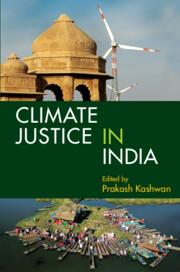Book contents
- Frontmatter
- Contents
- List of Poems and Artworks
- List of Tables
- List of Figures
- List of Abbreviations
- Preface and Acknowledgements
- 1 Introduction: Climate Justice in India
- 2 Urban Climate Justice in India
- 3 How Just and Democratic Is India’s Solar Energy Transition?: An Analysis of State Solar Policies in India
- 4 Extractive Regimes in the Coal Heartlands of India: Difficult Questions for a Just Energy Transition
- 5 Climate Justice Implications of the Relationship between Economic Inequality and Carbon Emissions in India
- 6 Climate Action Plans and Justice in India
- 7 Social Mobilizations for Climate Action and Climate Justice in India
- 8 Reimagining Climate Justice as Caste Justice
- 9 Intersectional Water Justice in India: At the Confluence of Gender, Caste, and Climate Change
- 10 Realizing Climate Justice through Agroecology and Women’s Collective Land Rights
- 11 Conclusion: Pathways to Policies and Praxis of Climate Justice in India
- About the Editor and Contributors
- About the Poets and Artists
- Index
2 - Urban Climate Justice in India
Published online by Cambridge University Press: 03 November 2022
- Frontmatter
- Contents
- List of Poems and Artworks
- List of Tables
- List of Figures
- List of Abbreviations
- Preface and Acknowledgements
- 1 Introduction: Climate Justice in India
- 2 Urban Climate Justice in India
- 3 How Just and Democratic Is India’s Solar Energy Transition?: An Analysis of State Solar Policies in India
- 4 Extractive Regimes in the Coal Heartlands of India: Difficult Questions for a Just Energy Transition
- 5 Climate Justice Implications of the Relationship between Economic Inequality and Carbon Emissions in India
- 6 Climate Action Plans and Justice in India
- 7 Social Mobilizations for Climate Action and Climate Justice in India
- 8 Reimagining Climate Justice as Caste Justice
- 9 Intersectional Water Justice in India: At the Confluence of Gender, Caste, and Climate Change
- 10 Realizing Climate Justice through Agroecology and Women’s Collective Land Rights
- 11 Conclusion: Pathways to Policies and Praxis of Climate Justice in India
- About the Editor and Contributors
- About the Poets and Artists
- Index
Summary
Introduction
Indian cities are especially vulnerable to climate change due to their rapid population growth, high levels of socioeconomic inequality, and the general inability of infrastructure and public services to adapt to projected impacts (Revi 2008; Sharma and Tomar 2010). Although the neoliberal reforms introduced in India since the early 1990s have enabled the broader participation of non-state actors in decision-making, an ideological preference for entrepreneurial approaches to urban governance have largely led to the withdrawal of the state from delivering basic services (Datta 2015). Revenue shortfalls and lack of administrative capacity have further decreased the ability of cities to deal with climate impacts and risks (Cook and Chu 2018; Sharma et al. 2014). These effects are felt most acutely by the urban poor, who are disproportionately exposed (Michael and Vakulabharanam 2016; Satterthwaite et al. 2007).
Since the 1990s, there has been a growing awareness of climate change among government officials. For the next two decades, governmental interventions in Indian cities were confined to climate mitigation and targeted select manufacturing, construction, and energy sectors (Dubash et al. 2018). To be fair, climate adaptation was still a relatively nascent priority for India, and its policy focus was on furthering its geopolitical role in global climate negotiations. As a nation that saw itself as a rapidly industrializing global power, India aggressively pushed for the country's ‘right to development’ despite its significant exposure to climate change impacts (Gupta 2010). Indian negotiators highlighted how industrialized nations could support India through technology, resource, and capacity transfers that will allow it to ‘leap frog’ from fossil-fuel-intensive to more sustainable forms of development. Widespread awareness of climate adaptation only emerged in the late 2000s, spearheaded by transnational, civil society, and national scientific bodies that documented changing climatic patterns and advocated that subnational governments play a role in addressing climate risks (Khosla and Bhardwaj 2019b; Sharma, Singh, and Singh 2014; Sharma et al. 2014). Since then, and as climate adaptation has moved from the policy to the implementation space, there have been growing concerns that structural inequalities in urban development in India may dilute or even redirect the intended benefits of climate adaptation.
- Type
- Chapter
- Information
- Climate Justice in India , pp. 25 - 49Publisher: Cambridge University PressPrint publication year: 2024
- Creative Commons
- This content is Open Access and distributed under the terms of the Creative Commons Attribution licence CC-BY-NC 4.0 https://creativecommons.org/cclicenses/



